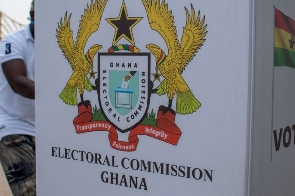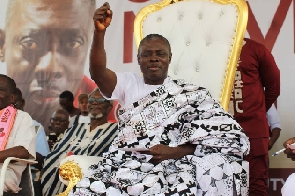Opinions of Tuesday, 29 December 2009
Columnist: Atitsogbui, Paul Parker
NPP’S 7.3% Economic Growth Is Misleading And Sakawa!!
It was all joy when the government statistician made the announcement of an all time high economic growth which turned out to be one of the NPP’s 419. It is recalled that on the 29th April 2009, Dr. Grace Bediako the government statistician at a press conference announced the 2008 economic growth using the expenditure approach and 1993 as the based year. The value of the GDP was quoted as GH¢795.1million. This means our economy had a growth to that value, a self-induced figure far from the reality. I hope and believe that after reading this article your sentiment will be encapsulated.
We must first try to understand the concept of the GDP (Gross Domestic Product) and Economic growth.
GDP measure all the economic activities of a country within a year and values it in monetary terms. In other words, it is the monetary value of all goods and services produced in a country within a year. It takes into account all the economic activities of an individual, business and government. Again, GDP is measured using Income, expenditure and output approaches and either of these gives the same outcome. Thus one’s output/production is the same as his income in monetary terms and his income are equal to his expenditure all things being equal. The income approach considers all the income of the government, businesses and individuals. The expenditure and output approaches respectively consider the aggregate expenditure and output of all the three units above. Economic growth on the other hand is the percentage difference of the present GDP and that of the previous year. For instance, GDP for 2008 was quoted as GH¢795.1million as against that of 2007 GH¢741.2million, the percentage difference is 7.3% which is the economic growth for 2008.
Lets assume a household with annual income of GH¢400 comprising of GH¢300 from the father a teacher and GH¢100 from the mother a trader. If we want to calculate the GDP of such a household using any of the approaches will give us GH¢400 all things being equal. On the other hand let’s assume that the household this year decides to borrow GH¢200 from the bank to be paid over two years. Using income and output approach we will get GH¢400 which is the actual economic value of the household. However, using the expenditure approach which only takes into account the total expenditure of the household for the year under consideration, it will give us GH¢600 which gives a misleading economic value of the household.
The latter scenario is exactly what Ghana fines itself in. Ghana’s deficit forms unprecedented 15% of our total GDP in the year which we claim to have achieved the highest economic growth of 7.3%. I must emphasize at this point that the figure obtained by the statistical service using the expenditure approach is the true or actual figure but not the correct economic value of Ghana at that point in time, as the GDP concept requires.
The NPP government on 27 September 2007 successfully raised $750million at 8.5% through Eurobond, sold Ghana telecoms for GH¢ 900million, owe GH¢850million to contractors, owe salaries of fresh teachers and nurses, among other monies which in the real sense was not generated or produced from the economy as the concept of GDP and economic growth requires. The true economic value during the 2008 would have been deducting all these borrowing before getting the true value. The net effect is that, all these monies have to come out from our economy this year which by logical conclusion will contract the economy. Ironically, the same NPP government is today chastising the present government for projecting 4.7% economic growth this year, knowing very well the mess they have created.
The macroeconomic stability achieved over the past 11month by the economic team has given hope to Ghanaians that the future is very bright and the better Ghana agenda is on course. Inflation has further declined to 16.92% at the end of November with the cedi becoming stronger against the major currencies over the past month. This means the humble Professor has responded to the call of Nana Akuffo Addo to fix the economy.
Even though expects predicted a fall in the inflation, many did not expect it to fall from 18.04 % (inherited from the NPP) to the current level, given the marginal rate of decline throughout the year.
The macroeconomic stability has been achieved as a result of austere measures contained in the 2009 budget which the minority unfortunately described as ‘cut and paste budget’ The government kept to the stringent spending target to put the economy on a stabilization path. This is a mark of prudence on the part of the government to keep the spending levels within the targets announced in the budget statement. Also the tight monetary policies which have led to the non-payment of contractors for jobs executed, has to some extent also accounted to the macroeconomic stability.
Expects argued that the private sector could not do well to stimulate the economy in an economy where the inflation hovers over and above 20%, and also renders people for whom the government initiates policies impoverished. Governments all over the world strike a balance between lower inflation and investment in the productive sector and I urge the government to work harder in this regard.
It’s the hope and dreams of all Ghanaians that the needed momentum to put the economy on the path for better Ghana as envisage by the 2010 budget statement will be pursued religiously, including the support for the agricultural sector, bearing in mind that the food component of inflation plays a critical role in reducing the cost of living.
The government should however, be mindful that any anti- inflationary measures which do not seek to increase productivity to match up with the supply of money either in the short or long term cannot stand the test of time. As much as I support the government in its spending policies, I would also encourage it to spend especially in the productive sector of the economy which has the potential to create employment. However, such spending must be within the reasonable level.
Once again, I say, kudos to Dr. Kwabena Duffour (Mr. slow but sure) and his able team. I also expect Nana Akuffo Addo to be honest enough and commend the president for fixing the economy so that Ghanaians will take him for serious. I will therefore, call on all Ghanaians to have faith in the present government because all the economic indicators i.e inflation, exchange rate, bank rate among others are pointing to a positive direction, and with good global economic environment the better Ghana agenda is on course!
Again, this article is not suggesting a conclusive knowledge on the topic under consideration but rather an invitation for further education and discussion. Long live Ghana, long live Ghanaians.
Paul Parker Atitsogbui (Msc Business and Financial economics)












